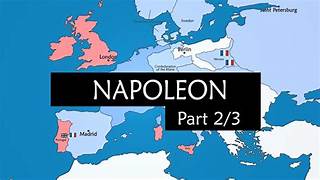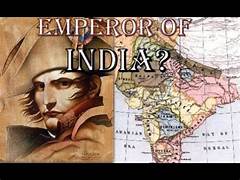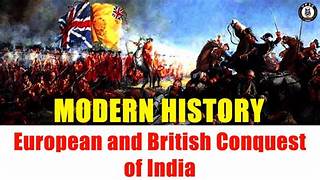From Europe to India, Napoleon Bonaparte’s conquest of nations is a remarkable chapter in history. Known for his military brilliance and ambition, Napoleon’s campaigns across Europe have left an indelible mark on the map. But his conquests didn’t stop at the borders of the continent; Napoleon’s ambitions extended to the Indian subcontinent as well. In this article, we delve into the lesser-known aspects of Napoleon’s grand plan to conquer India.
Napoleon rise to power in France
Napoleon Bonaparte’s journey to becoming one of history’s most renowned military leaders began in France. Born in Corsica in 1769, he rose through the ranks of the French army during the tumultuous period of the French Revolution. With his military prowess and charismatic leadership, Napoleon quickly gained recognition and was appointed as the First Consul of France in 1799.
Napoleon wasted no time in consolidating his power and implementing reforms in France. His administrative, legal, and educational reforms laid the foundation for a modern and centralized state. With the support of the French people, he declared himself Emperor of the French in 1804, marking the beginning of his transformative reign.

The Napoleonic Wars and the European conquest
Emboldened by his newfound power, Napoleon set his sights on expanding French influence across Europe. The Napoleonic Wars, which lasted from 1803 to 1815, saw Napoleon’s armies engage in numerous military campaigns against European powers. Through a combination of strategic brilliance and superior military tactics, Napoleon achieved remarkable victories and rapidly expanded French territory.
One of Napoleon’s early conquests was the invasion of Italy. By defeating the Austrian and Italian armies, he established French control over the Italian Peninsula. This not only secured valuable resources and territory but also allowed Napoleon to weaken Austria, one of France’s main rivals.
Napoleon’s campaign in Egypt and the Middle East
Eager to challenge British dominance in the Indian Ocean and gain access to lucrative trade routes, Napoleon launched a campaign in Egypt and the Middle East in 1798. The expedition aimed to disrupt British trade with India and establish French influence in the region. Although initially successful, Napoleon’s ambitions were ultimately thwarted by a combination of British naval strength and local resistance.
Despite the failure of his campaign in Egypt, Napoleon’s presence in the region had a lasting impact. His expedition sparked interest in Egyptology and led to significant archaeological discoveries, such as the Rosetta Stone. It also laid the groundwork for future European involvement in the Middle East.
The Battle of Austerlitz and the defeat of the Third Coalition
One of Napoleon’s most famous victories came at the Battle of Austerlitz in 1805. Faced with a coalition of European powers seeking to halt his expansion, Napoleon strategically outmanoeuvred and defeated the combined forces of Austria and Russia. The battle showcased Napoleon’s military genius and solidified his reputation as an unbeatable commander.
The defeat of the Third Coalition at Austerlitz allowed Napoleon to further expand French influence in Europe. He established the Confederation of the Rhine, a group of German states under French protection, and appointed his family members as rulers of various territories. The French Empire reached its peak, with Napoleon controlling much of continental Europe.
Napoleon conquest of Spain and Portugal
As Napoleon’s empire expanded, he turned his attention to the Iberian Peninsula, aiming to bring Spain and Portugal under his control. By installing his brother Joseph as the King of Spain, Napoleon sought to secure French interests and weaken British influence in the region. However, the Spanish people fiercely resisted French occupation, leading to a protracted and costly conflict known as the Peninsular War.
Overview of Napoleon Time in India
Napoleon’s interest in India can be traced back to his early days as a young military officer. During his campaigns in Egypt, he encountered Indian soldiers who were part of the British army. This encounter sparked his curiosity about India and its rich history and culture. Later, as the Emperor of France, Napoleon sought to establish diplomatic relations with India and explore opportunities for trade and cooperation.
Analysis of the Themes and Ideas in Napoleon Books
Napoleon’s book collection covers a wide range of topics, offering a comprehensive understanding of his perspectives on India. Historical accounts such as “The History of the Indian Subcontinent” and “The Rise and Fall of the Mughal Empire” provide insights into India’s past and its impact on the present. Philosophical treatises like “The Upanishads” and “The Bhagavad Gita” showcase Napoleon’s fascination with ancient Indian wisdom and spirituality.
Tracing Napoleon’s Ideas for Governance in India
One of the key aspects of Napoleon’s vision for India was his interest in governance. Books like “The Artha Shastra” and “The Prince” influenced his ideas on effective governance and administration. Napoleon believed that India could benefit from a centralized system of governance, which would ensure stability and promote economic growth. He also emphasized the importance of education and the need for a meritocracy to drive progress.

Napoleon’s Vision for Economic Development in India
Napoleon recognized India’s potential as an economic powerhouse and sought to tap into its resources. His books on economics, such as “The Wealth of Nations” and “India’s Economic Potential,” reveal his belief in free trade and the importance of infrastructure development. Napoleon envisioned India as a hub for trade and commerce, with a focus on modernizing industries and improving transportation networks.
Napoleon’s Perspective on Religion and Culture in India
Religion and culture played a significant role in shaping Napoleon’s understanding of India. Books like “The Ramayana” and “The Mahabharata” exposed him to the rich mythology and traditions of India. Napoleon admired the diversity of religious beliefs and cultural practices in India, seeing them as a source of strength and unity. He believed in fostering religious tolerance and cultural exchange to promote societal harmony.
Impact of Napoleon Ideas on India’s Future
Napoleon’s ideas and vision for India had a lasting impact on the country’s future. His emphasis on education and infrastructure development laid the foundation for modern India’s education system and transportation networks. His belief in religious tolerance and cultural exchange influenced India’s approach to secularism and multiculturalism. Napoleon’s ideas continue to shape India’s trajectory as a global player in the 21st century.
Criticisms and Controversies Surrounding Napoleon’s Vision for India
While Napoleon’s vision for India was widely praised, it was not without its critics and controversies. Some argued that his emphasis on centralization and meritocracy undermined regional autonomy and perpetuated inequality. Others criticized his approach to religion, claiming that it marginalized certain religious communities. Complexities of Napoleon’s vision and the challenges of implementing it in a diverse and complex society like India.
In his quest for knowledge and vision for India, Napoleon Bonaparte amassed an impressive collection of 60 books. These books, which provided him with insight and inspiration, offer a fascinating glimpse into his understanding of India and its potential. From historical accounts to philosophical treatises, Napoleon’s collection reflects his desire to understand the culture, society, and governance of this diverse country.
The Significance of the 60 Books
Napoleon’s collection of 60 books holds great significance as it sheds light on his intellectual pursuits and his desire to comprehend the intricacies of India. These books were carefully chosen by Napoleon himself, representing a wide range of subjects that were of particular interest to him. By studying the contents of these books, we can gain valuable insights into his vision for India and the impact it had on his policies and decisions.
Legacy of Napoleon conquest of nations
Napoleon’s conquests reshaped the political landscape of Europe and left a lasting impact on the regions he sought to conquer. His administrative reforms, such as the Napoleonic Code, introduced concepts of equality, individual rights, and legal uniformity that influenced legal systems worldwide.
Furthermore, Napoleon’s military strategies and tactics revolutionized warfare. His emphasis on speed, mobility, and centralized command structures laid the foundation for modern military doctrines. His campaigns also led to advancements in logistics, communications, and medical care on the battlefield.
In conclusion, Napoleon Bonaparte’s conquest of nations was a remarkable and complex undertaking that spanned from Europe to India. From his rise to power in France to his ultimate defeat at Waterloo, Napoleon’s military brilliance and ambition left an indelible mark on history. While his grand plan to conquer India ultimately failed, his legacy as a transformative leader and military genius endures to this day.



